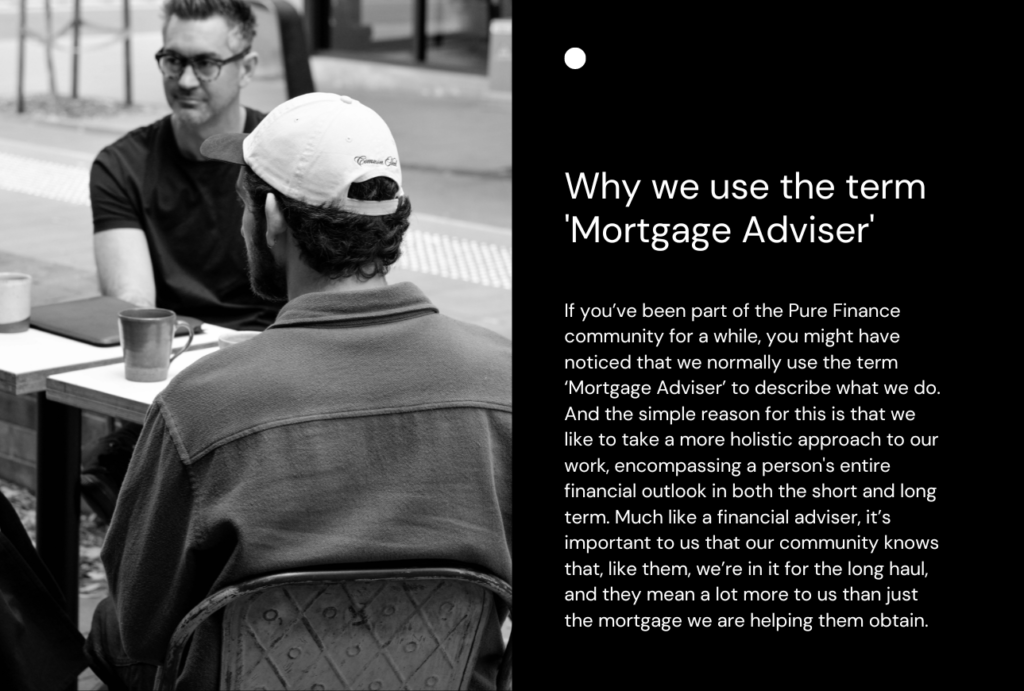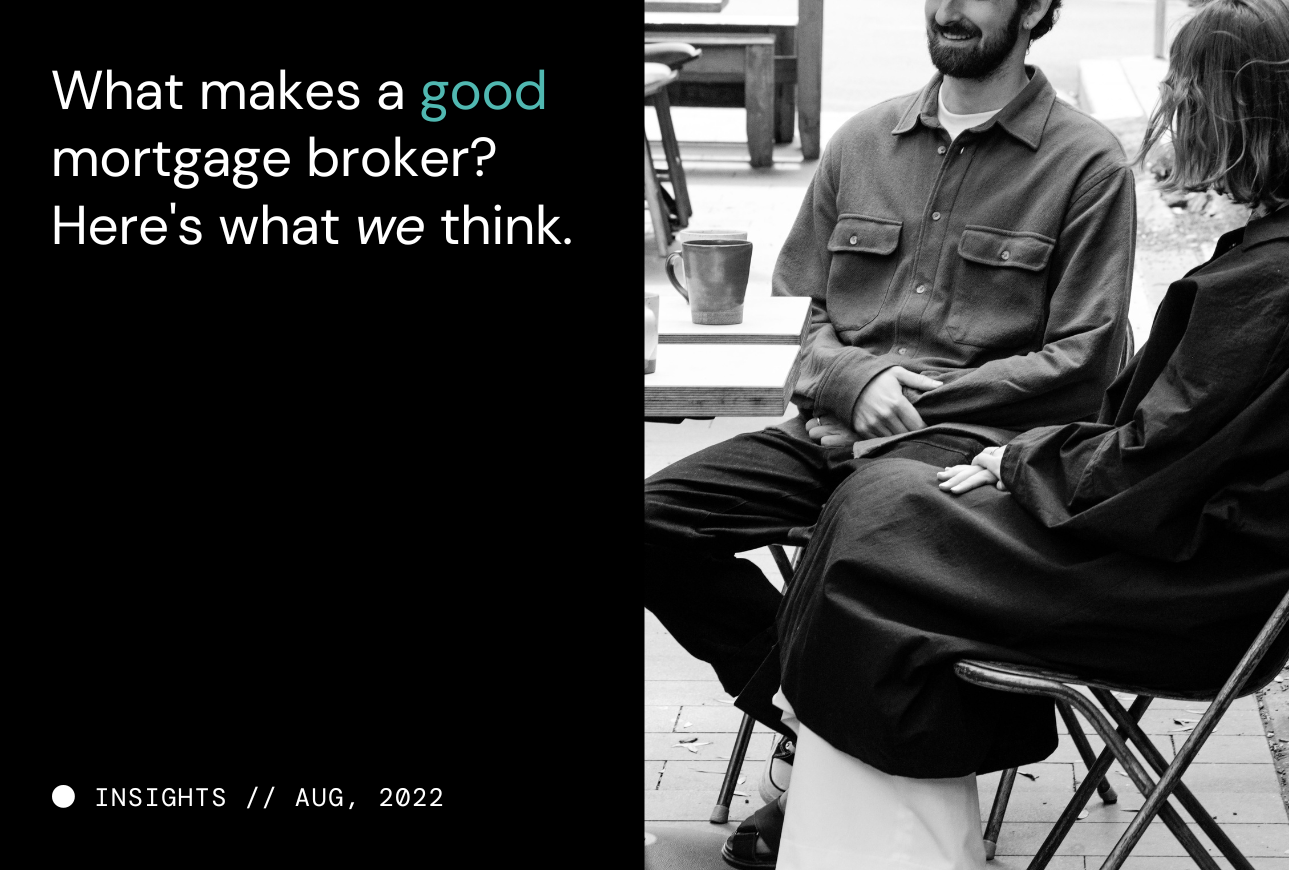Let’s be honest, there’s a lot to sort out when buying a home. The process can be confusing and often overwhelming, especially the first time round. That’s why many prospective home buyers choose to work with a mortgage broker.
However, not all mortgage brokers are created equal, and while most claim to be working solely in their clients best interests, the unfortunate reality is that it isn't always the case. On the flip side, a good and ethical broker can be a powerful way to help you achieve your goal of home ownership (particularly if your situation is a little bit ‘out of the box’) whilst also saving you time and money in the process. Plus, being a free service means that mortgage broking remains one of the few financial services that is accessible for everyone.
Now, considering that we are mortgage brokers ourselves (we actually like to use the term ‘mortgage advisers’ - more on that below) we’re obviously going to say that engaging a mortgage broker is a good idea. Don't worry, we're also rolling our eyes...
But in all seriousness, with almost every member of our team hailing from outside of the finance industry, we’ve always been driven to create the kind of finance company that we’d want to work with ourselves. So, we're putting ourselves in your shoes and as objectively as possible, we’re listing the things that we think make a good mortgage broker. In true Pure Finance style, some of them might surprise you (though, if you’ve been around here for a while, they probably won’t)! 😉

First up, what does a mortgage broker actually do and why would you use one?
Before we get into what makes a good one, let’s have a quick chat about what a mortgage broker actually does, and why you might use one when getting a home loan.
What is a mortgage broker?
A mortgage broker acts as an intermediary between you and the bank when you’re applying for a home loan. They’re a financial services professional who helps property buyers access the right loan for their needs across a range of different lenders.
What do they do?
With an in-depth understanding of all the different banks and loan products that are available, they help property buyers navigate the complex world of home loans, from the research phase right through to application and then settlement - for free!
What are the benefits of using one?
While it’s absolutely possible to apply for a home loan without using a mortgage broker, there are a number of benefits to having a good one by your side. Here’s some of the main ones:
- Choice! - Being independent (more on that later) means that a mortgage broker can offer you a whole range of different loans from different lenders, whereas a bank can really only offer you loans from, well. . . them. This means you’re more likely to *actually* get the best possible loan for you, and not just the best possible loan at the particular bank you happened to walk in to.
- Expert knowledge - When the one thing you do is home loans, you get pretty damn good at it. As well as being experienced and knowledgeable, a good mortgage broker will handle the entire loan process, keep things moving, and help you avoid pitfalls. Plus, if anything unforeseen does go wrong, they are best placed to help you get through it unscathed.
- An advocate for you - A good, independent mortgage broker is there to give you expert loan advice and assistance, and is legally required to act in your best interest. This can be a real game changer for those attempting to navigate the complex and often overwhelming world of home loans.
Are they really acting in your best interests? A few pointers to remember:
- At the end of the day, the more you borrow, the more a broker gets paid. And the more you borrow, the more expensive your loan will be over the long term. So, to really be acting in your best interest, your broker should technically be aiming to help you achieve your home ownership goal, without encouraging you to borrow more than you need.
- Are you trying to borrow as much as you can? In an incredibly competitive property market it is certainly tempting. Has your broker helped you understand the true cost of the mortgage? And how borrowing at your maximum limit will impact your lifestyle moving forward?
- It’s a common practice in the mortgage industry to poach clients and one way brokers do this is by offering cash back for refinances. Sometimes you might hear ‘we’ll refund you our commission if you refinance your loan with us’. Cool huh? Well, not always. In addition to being paid upfront by the bank, brokers also receive an ongoing ‘trail’ commission for ‘servicing’ your loan, and in most cases this trail will eventually overtake the upfront commission they passed on to you. But hang on, getting a bit of cash for nothing, that doesn’t sound too bad? And you’d be right in thinking that. Again, it’s all in the fine print. Is the new loan product you’re being offered genuinely better than the one that you’re already on? Does your current bank have any comparable products (often they will), and is a move to a whole new bank really necessary? Have they really done all that they can to get your current bank to come to the table? A good broker won’t put you through the rigmarole of a refinance if the net benefit is negligible, and often (as proven by our annual loan reviews) getting a better deal on your home loan can be as simple as just asking for one!

So, what makes a good mortgage broker?
In our opinion, things like ‘getting you a low interest rate’ or ‘acting in your best interests’ are kind of like the bare minimum of mortgage broking, and while these things are still very important when it comes to finding a good broker, they certainly shouldn’t be 'optional extras' or 'nice to haves'. So what are some of the things that sets a good mortgage broker apart? Here’s what we think.
1. Are they transparent? Like, really transparent?
The finance industry (and mortgage broking in particular) is notorious for using confusing, jargon-filled language and hiding stuff in the fine print. Ew. 😒
One of the most important aspects of engaging a mortgage broker, and indeed any finance professional, is that they make you feel a) comfortable with the process and b) that you can trust them. And we think that one of the only ways to authentically do this, is by practising radical transparency. Here’s what we think this can look like:
- By using jargon-free language that is clear and easy to understand, helping people to feel empowered by the process and not intimidated or ‘that they are stupid’
- By being proactively transparent and never hiding anything in any fine print. Ever.
- By being open about how they and others in their business are paid, and disclosing any/all other payments they may receive for ‘referrals’ from other parties up front.
- By backing up business promises with proof of outcomes (very important in the age of greenwashing). For example: do they make charitable donations? Great! To whom? When? And how much?
2. Is their service free? And importantly, how do they get paid?
Typically, engaging a mortgage broker in Australia is a free service, with the bank or lender paying the broker for introducing the client. And while it’s great to be able to offer the service for free, it’s really important that there is full transparency around how the mortgage broker will be paid.
In our opinion, this should include not just the money received from banks or lenders, but also, how individual brokers are paid within a larger organisation. For example, are employees paid on commission only, encouraging a 'sales driven' environment (which allows unethical practices to thrive)? Or are employees paid a fair and equitable salary, encouraging them to act ethically and in a client's best interest, no matter what? Similarly, any other payments that may be received by the broker for ‘referrals’ should also always be disclosed, proactively and upfront. We’ve even heard stories of some brokers who have tried to invoice clients for their work, without quoting the fee beforehand. Yikes! 😬
If a mortgage broker offers all of this information to you upfront and even better, unprompted, then that’s probably a good sign. If you have to ask, or if they seem ‘unenthusiastic’ about providing you with the answers, then it’s probably (definitely) a bad sign.
3. Are they purpose-driven?
Maybe you’re surprised to see this one on the list? Here’s why we think it’s really important. Often, reports of misconduct or unethical behaviour in financial services can be linked to a sales-centric culture, and when financial organisations make increasing profits their only purpose, it is inevitable that their clients and community will suffer. By choosing a broker that is driven by purpose (and not profits) you’ll be more likely to reap the rewards of a service that is truly in line with your best interests, and probably, the best interests of your wider community.
How to know if a broker is purpose driven? One way to find out is by looking at how they measure ‘success’ in their business. Are key milestones for business success articulated through sales and loan volume numbers alone? Or maybe the size of the loans they are brokering? (🚩🚩🚩) If those are the kind of metrics they use to measure their success, then that’s probably what they value the most. 🙃
4. Are they independent from banks and other lenders?
Arguably one of the main benefits of using a mortgage broker vs. a bank is having access to a wide range of loans at a bunch of different lenders. But did you know that some mortgage broker companies are actually partially (and in some cases fully) owned by major banks? 😬 This is another one that is important, but also, often hidden in the fine print.
To get a truly objective view on your options we think it’s important to look for an independent mortgage broker, i.e. one that isn't owned by a particular bank or lender. This means they will be less likely to give preference to certain financial institutions or loan products and are purely focused on getting you the best option for your needs.
Something else to consider, is whether the broker has their own credit licence (also known as an Australian Credit Licence or ACL). The main things to know here are that having an ACL means that a broker is more likely to have access to a wider range of banks and lenders than a broker who is operating as a ‘credit representative’ (or an ACR). They are also more likely to be experienced, as a broker will need at least 2 years experience working in the industry before they can apply for an ACL. Apologies for the acronym overuse here (finance cannot get enough of these 🙄).
5. Are ethics, equality and sustainability important to you (and them)?
Are you passionate about turning this climate crisis around? How about working towards a world with increased racial and gender equality? We hear you! Which is why we, like you, also want to engage with organisations that are doing their part to create a more just and equitable world, while doing business. By now, it’s pretty clear that choosing to work with financial institutions that are committed to having a positive impact is an incredibly powerful way to help us address some of the big (BIG) challenges we are facing as a collective. And making your mortgage a force for good is absolutely no exception.
From the B Corp movement, to using profits for purpose, there are so many ways the finance industry can become a more meaningful part of the solutions to these problems, and we think this requires a tangible, measurable and accountable commitment to making finance a force for good - for all of us.
6. How else do they provide value to their clients and community?
As we mentioned earlier, we believe getting you a ‘good deal’ on your home loan barely covers the basics of being a good mortgage broker. We think it’s also really important to get an understanding of all the other ways a mortgage broker adds value to their clients and community, once the initial work is complete. For us, one of the most important aspects of our business is demonstrating to our community how much we value them. We do this in a number of ways, but here are a few of our favourites:
● Our Annual loan reviews, which have us check in on, and renegotiate the loan of every single client annually, to ensure low loan costs are maintained year in and year out (for free!). Additionally, we track, measure and report on the results of these reviews for transparency, but to also articulate the positive impact they can have for our community, both in the short and long term. Interested to see what that looks like? Take a look at our 2021 numbers here.
● Our impact giving model, Pure Community, which allows us (and our clients) to use finance as a force for good. As an organisation, we’re committed to putting 5% of our total revenue into the hands of grassroots and changemaking organisations who are working hard to make the world a more just and equitable place. In 2021, that meant our clients helped facilitate a total of $49,723 (5% of revenue = 40.84% of profits) being used to create positive social and environmental impact.
● Our Annual Impact Reporting, which not only acts as an accountability mechanism by which we evidence our ‘for purpose’ business commitments, but also allows our clients and wider community to share in the positive impact created by us all collectively challenging the finance industry status quo, and offering a framework for other business who want to convert their work into a force for good.
● Our free Wine + Wisdom events, which provide an opportunity for anyone in our community to participate in an engaging, approachable (and delicious) discussion about personal finance, matched with incredible food and wine.
● Our education and advocacy platform Ladies Talk Money, an online space dedicated to hosting courageous and unapologetic conversations about money for women and non-binary people, with a central focus on the structural and social inequities inherent in our financial systems.
Getting you a great interest rate, having access to a wide range of banks, helping you navigate the finance process - there can be lots of benefits to working with a mortgage broker when taking out a home loan or refinancing. But if we can be perfectly honest, we’re of the opinion that these are the kinds of things that are all part of the job description, and are not examples of a broker going ‘above and beyond.’ After all, acting in a client’s best interest is not a point of difference - it’s a legal obligation. Literally.
We think a good mortgage broker should be committed to turning a jargon-filled, overwhelming and, at times, disempowering process into one that enables people to feel included, confident and in control of their financial future. They should view transparency and accountability as fundamental pillars of their service, in turn, allowing their clients to feel confident that they are in ethical and trustworthy hands. They should be committed to always putting their client’s and community’s best interest before their bottom line, even if it costs them profit, clout and accolades. They should be able to easily articulate the aspects of their business and service that truly sets them apart, and they should be excited by the chance to do so. And we strongly believe that they should also be doing everything they can to contribute to the movement that aims to make the finance industry a more ethical and equitable one - for all of us.
Enjoyed this read? Did it give you some food for thought? Learned something new about mortgage brokers? We’d love to know your thoughts! → info@nullpurefinance.com.au
Any finance information contained in this post is general advice only, and doesn't take into account your personal circumstances or goals. You should always reach out, or seek professional advice, before making any financial decisions.
